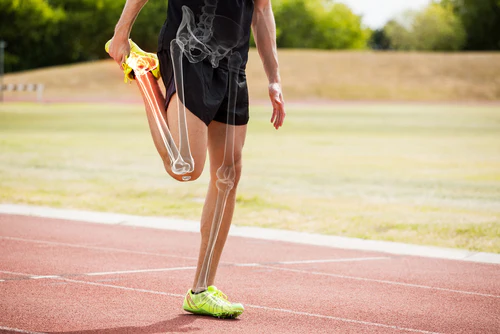The skeletal system is composed of bones and joints and is the foundation of our body’s structure. We are born with 300 separate bones and are only left with 206 by the age of 25. Surprisingly enough, some of our more tiny bones fuse together as we grow. Our bones are comprised of 80 % compact bone and 20% spongy bone. Compact bone is hard and strong, which allows the body to support its weight, while the spongy bone is filled with holes that contain bone marrow, nerves and blood vessels. In this article, we will explore some of the best vitamins for bone health and how we can incorporate bone health supplements along with diet and exercise to prevent skeletal degeneration.
What is Osteoporosis?
Osteoporosis is characterized as a loss of calcium from the bone. This illness is found most frequently in post-menopausal women. And and men over 70 years of age. By the age of 30, calcium no longer contributes to the building bone, neither does it add to bone mass. Upon reaching peak bone mass around that age, we must replenish what is lost daily through our activities.
That’s why ensuring sufficient calcium intake through diet or supplementation is crucial to preserve bone mass and prevent bone loss. When calcium is deficient (along with other key nutrients), deterioration of the bone tissue will result in bone fragility and susceptibility to bone fractures.
Other symptoms of Osteoporosis include lower back pain, stooped posture and loss of height. Some risk factors that may expedite Osteoporosis include nutritional imbalances, smoking, alcohol, caffeine, and estrogen-related bone mass, like menopause.
The 5 best vitamins & supplements for bone health
1. Calcium
Calcium is the most abundant mineral in the body. 98% found in the bones, 1% in the teeth and 1% in other tissues. Daily adequate intake is crucial because, during rest, the body extracts calcium from the bones for use elsewhere. Hormonal shifts during menopause can cause the bone to lose calcium, resulting in osteoporosis in women. I recommend 1500mg a day. Food sources include seeds, beans, legumes, sea moss and dairy.
2. Vitamin D for bone formation
Vitamin D is essential for absorbing calcium and assimilating phosphorus, both vital for bone formation. It additionally assists in synthesizing enzymes crucial for transporting calcium.Vitamin D participates in cell reproduction, blood cell formation, and boosts the immune system.
I recommend 5000 IU a day for strong bones and overall health. You can find Noo-tropic tried and trusted supplementation here, Vitamin D 5000 IU supplement.
Dietary sources include egg yolks, butter and fortified milk.
3. Magnesium
Magnesium plays an important role in the structure of the bone by stimulating the calcitonin hormone. Calcitonin functions by drawing calcium from the blood and soft tissues, then redistributing it back into the bone for utilization.
This process helps prevent Osteoporosis and other degenerative bone diseases. The bone holds 60% of the body’s magnesium, and experts recommend consuming 400-600 mg daily for optimal health.health.
The National Library of Medicine links magnesium deficiency, especially in North America and Europe, to diets abundant in processed foods and lacking micronutrients. Green leafy vegetables, nuts, whole grains, and legumes abound with magnesium.
4. Vitamin C
Vitamin C not only acts as a powerful antioxidant but also plays an essential role in collagen formation, the foundation of bone mineralization. Collagen is the most abundant protein in the body and one of its many responsibilities is to strengthen the bone and improve bone density.
Since it’s a water-soluble vitamin, your body will excrete what it doesn’t need on a daily basis, so continuous supplementation at 100-200mg a day is key. Foods rich in vitamin C include citrus fruits, broccoli, bell pepper, cauliflower, kale, lemons, papaya and strawberries.
5. Multivitamin/Multimineral
A multivitamin with minerals is essential for bone health. It’s important to check the formula and ensure that it contains vitamin K, Boron and Zinc as they are necessary for calcium bone metabolism.
If you want to eliminate the guessing game, Noo-tropics daily multivitamin contains these vital nutrients, along with many others that will help maintain bone and overall health.
Additional lifestyle tips for bone health
Exercise
Weight-bearing exercises like:
- walking
- weight lifting
- yoga
- T’ai chi
These activities help to build and maintain bone density. Incorporate at least one of these key exercises into your daily routine to prevent any form of bone disease.
Some bone-friendly foods that one can begin to incorporate in their diet include whole grains, oats, fresh fruits like grapes, pears, raisins, dates and peaches. Fresh vegetables like leafy greens, broccoli, cabbage, dandelion greens, kale and spinach. Other foods include legumes, low-fat dairy and fatty fish like salmon or herring.
Diet
All in all, a wholesome diet, exercise and the best vitamins for bones are the keys to prevention and maintenance of bone health. The skeletal system can be a very delicate one if we are not implementing the right foods or vitamins for bone growth and maintenance. Initiating appropriate steps by age 30 is advisable, as calcium intake becomes particularly crucial during this period. Prevention is always easier than a cure, take care of your bones so they can take care of you.
What to Avoid
Avoid excess protein as it leeches calcium out the bones. Also, try to avoid carbonated drinks, salt, caffeine, smoking, and excessive exercise. These factors can cause the bone to leach calcium.
Avoid excess protein as it leeches calcium out the bones. Also, try to avoid carbonated drinks, salt, caffeine, smoking, and excessive exercise. These factors can leach calcium from the bone.
Also read our blog on Walking While Working: Everyone is Different
